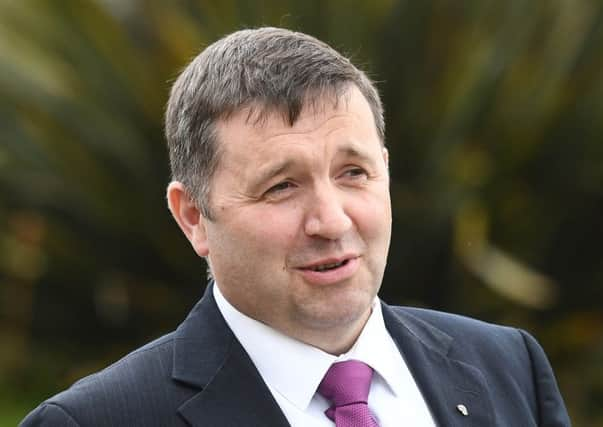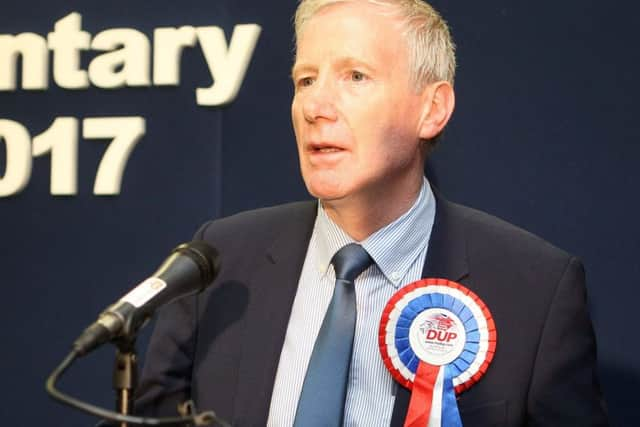Swann rejects Irish language act as DUP say all issues on discussion table


Meanwhile a senior DUP figure has indicated that the issue remains open for discussion with Sinn Fein – but only if and when the republican party allows the Stormont Executive to reconvene.
It comes after the new Northern Ireland Secretary formally announced that talks involving all five main parties will begin next Wednesday.
Advertisement
Hide AdAdvertisement
Hide AdSinn Fein said it understands there will be a two-week window for negotiations.


UUP leader Robin Swann told Radio Ulster that making sure all five major parties were involved was a “major” step, because having “a different set of eyes” in the talks may help create a breakthrough.
When it comes to one of the main stumbling blocks, an Irish language act, he told Good Morning Ulster: “We’ve made our position clear on an Irish language act – we see no need for it at this moment in time.
“We see no need for it in Northern Ireland.
“The Belfast / Good Friday Agreement allowed for the creation of two bodies: Foras na Gaeilge, and the Ulster-Scots Agency.


Advertisement
Hide AdAdvertisement
Hide Ad“The idea between those two language [bodies] was to keep politicians and politics out of language and culture. That was the rationale between those two bodies.
“Because when the agreement was brought about in ‘98, we knew the politicians couldn’t be trusted with those sensitive issues and I think that has proven right.
“So as a party we still see no need for an Irish language act.
“We have no problem with the Irish language or with Ulster-Scots, or promoting either of them, but it has to be without that.”
Advertisement
Hide AdAdvertisement
Hide AdDUP MP Gregory Campbell, who drew criticism in 2014 for a mock imitation of the Irish language and who later told his party conference the DUP “will never agree to an Irish Language Act”, told the News Letter: “Whatever anyone wants to discuss and agree can be discussed and agreed after we establish an Executive.”
If they did manage to get an Executive up-and-running, he said “we’d be amenable to discussing any and all of those after the Executive is established, but not holding the wider community in NI to ransom in order to get a pre-condition met before we set up an Executive which is what they’re doing at the moment”.
He added: “Nobody should take from my comment that because I’m not emphatically saying we wouldn’t rule it out afterwards, that might mean that it could be ruled in afterwards.
“Sinn Fein have a totally and utterly unreasonable position; asking for certain pre-conditions to be met before they get into government...
Advertisement
Hide AdAdvertisement
Hide Ad“We’re prepared to discuss any of those issues, everybody knows what our view is on issues like the Irish language act.
“We’re prepared to discuss them, but we’re not prepared to yield to a demand to have something implemented as a pre-condition to set up the Executive.”
He said among the changes the DUP want to see are “changes to the Executive so that a single party can’t bring the Executive crashing down again”.
He said unionists themselves should not “fall into the trap of setting pre-conditions – let’s set the government up and then discuss what changes, if any, should follow... all the issues will be discussed after we set up the Executive, and we wouldn’t exclude any of them for discussion”.
Advertisement
Hide AdAdvertisement
Hide AdNoting that Irish foreign minister Simon Coveney was present at the announcement launching the pending talks round, he wondered if it may have been “a deliberate attempt by the Republic’s government to try and inset themselves into the part of the talks process they don’t qualify for” – namely the so-called ‘Strand One’ issues, concerning the internal government arrangements of Northern Ireland.
He said “if the Republic’s government were trying to insert themselves into the formal discussions about the Strand One issue... we’ll not be engaging with the Irish government on the internal affairs. That’s been a long-standing approach.”